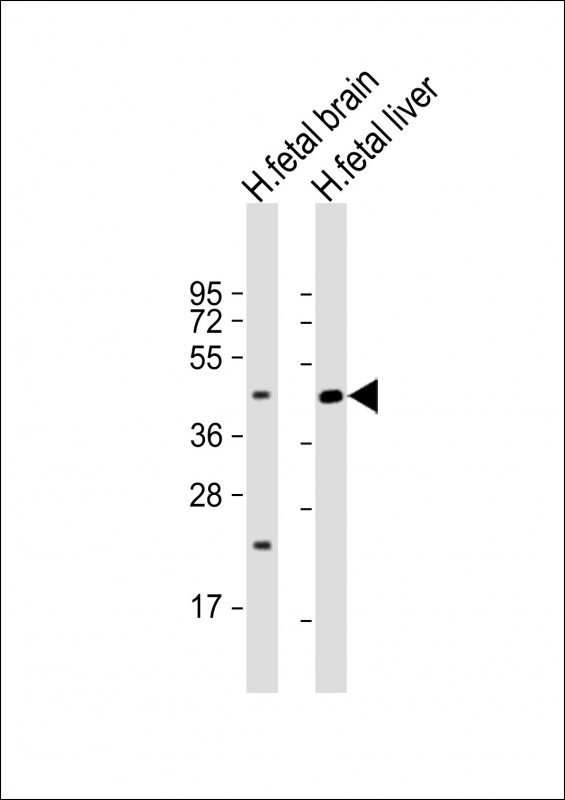
| WB | 1/2000 | Human,Mouse,Rat |
| IF | 咨询技术 | Human,Mouse,Rat |
| IHC | 咨询技术 | Human,Mouse,Rat |
| ICC | 技术咨询 | Human,Mouse,Rat |
| FCM | 咨询技术 | Human,Mouse,Rat |
| Elisa | 咨询技术 | Human,Mouse,Rat |
| Aliases | Zinc transporter 10, ZnT-10, Solute carrier family 30 member 10, SLC30A10, ZNT10, ZNT8 |
| Entrez GeneID | 55532 |
| WB Predicted band size | 52.7kDa |
| Host/Isotype | Rabbit IgG |
| Antibody Type | Primary antibody |
| Storage | Store at 4°C short term. Aliquot and store at -20°C long term. Avoid freeze/thaw cycles. |
| Species Reactivity | Human |
| Immunogen | This SLC30A10 antibody is generated from rabbits immunized with a KLH conjugated synthetic peptide between 331-359 amino acids of human SLC30A10. |
| Formulation | Purified antibody in PBS with 0.05% sodium azide. |
+ +
以下是关于SLC30A10抗体的参考文献示例(注:部分内容为示例性概括,实际文献可能需进一步核实):
1. **"SLC30A10 mutations cause idiopathic hypermanganesemia and neurologic disease"**
- **作者**: Tuschl, K. et al.
- **摘要**: 研究通过免疫印迹(Western blot)和免疫组化,使用SLC30A10抗体验证了突变体蛋白在患者肝组织中的表达缺失,揭示了该基因突变导致锰代谢异常及神经退行性病变的机制。
2. **"Manganese transport by SLC30A10 in Parkinson’s disease"**
- **作者**: Quadri, M. et al.
- **摘要**: 利用SLC30A10特异性抗体进行脑组织免疫荧光染色,发现该蛋白在黑质神经元中的定位异常与帕金森病相关锰蓄积有关,提示其在中枢神经系统中的保护作用。
3. **"SLC30A10 regulates hepatic manganese homeostasis by modulating biliary excretion"**
- **作者**: Avelino, M. et al.
- **摘要**: 通过免疫组化和Western blot分析,结合SLC30A10抗体,证实该蛋白在小鼠肝脏胆管上皮细胞高表达,调控锰的胆汁排泄,缺乏时导致肝锰蓄积。
4. **"Functional characterization of SLC30A10 in cellular manganese efflux"**
- **作者**: Chen, P. et al.
- **摘要**: 研究使用SLC30A10抗体进行细胞定位实验,发现该蛋白定位于细胞膜和高尔基体,敲低后锰外排能力下降,阐明了其作为锰转运体的功能。
建议通过PubMed或Google Scholar以“SLC30A10 antibody”或“SLC30A10 expression”为关键词检索最新文献获取具体信息。
The SLC30A10 antibody is a crucial tool for studying the SLC30A10 protein, a member of the solute carrier family 30 (SLC30) of zinc transporters. SLC30A10. also known as ZnT10. is a manganese (Mn)-efflux transporter predominantly expressed in the liver, brain, and gastrointestinal tract. It plays a vital role in regulating Mn homeostasis by facilitating cellular Mn excretion, thereby preventing toxic accumulation. Mutations in the SLC30A10 gene are linked to hereditary Mn neurotoxicity, characterized by parkinsonism, dystonia, cirrhosis, and polycythemia. Research on SLC30A10 is essential for understanding Mn-associated neurodegenerative and metabolic disorders.
The SLC30A10 antibody enables the detection and localization of the SLC30A10 protein in tissues and cell lines, aiding investigations into its expression patterns, subcellular distribution, and regulatory mechanisms. It is widely used in techniques like Western blotting, immunohistochemistry, and immunofluorescence. Studies utilizing this antibody have revealed its role in Mn detoxification pathways, hepatic function, and neuronal health. Additionally, it supports clinical research to identify SLC30A10 dysfunction in patients with suspected Mn metabolism disorders. Validated antibodies ensure specificity and reliability, making them indispensable for both basic research and diagnostic applications.
×